Big Data Engineers are the architects of data pipelines and infrastructure. They design, build, and maintain the systems that allow organizations to collect, store, and analyze large volumes of data efficiently and effectively.
Big Data Engineering skills include proficiency in programming languages like Python, Java, and Scala, as well as expertise in data processing frameworks such as Hadoop and Spark. Additionally, skills in data modeling, database management, and cloud platforms are essential for success in this role.
Candidates can write these abilities in their resumes, but you can’t verify them without on-the-job Big Data Engineer skill tests.
In this post, we will explore 9 essential Big Data Engineer skills, 10 secondary skills and how to assess them so you can make informed hiring decisions.
Table of contents
9 fundamental Big Data Engineer skills and traits
The best skills for Big Data Engineers include Programming Languages, Data Warehousing, ETL Processes, Hadoop Ecosystem, Data Modeling, SQL and NoSQL, Data Security, Cloud Platforms and Data Visualization.
Let’s dive into the details by examining the 9 essential skills of a Big Data Engineer.
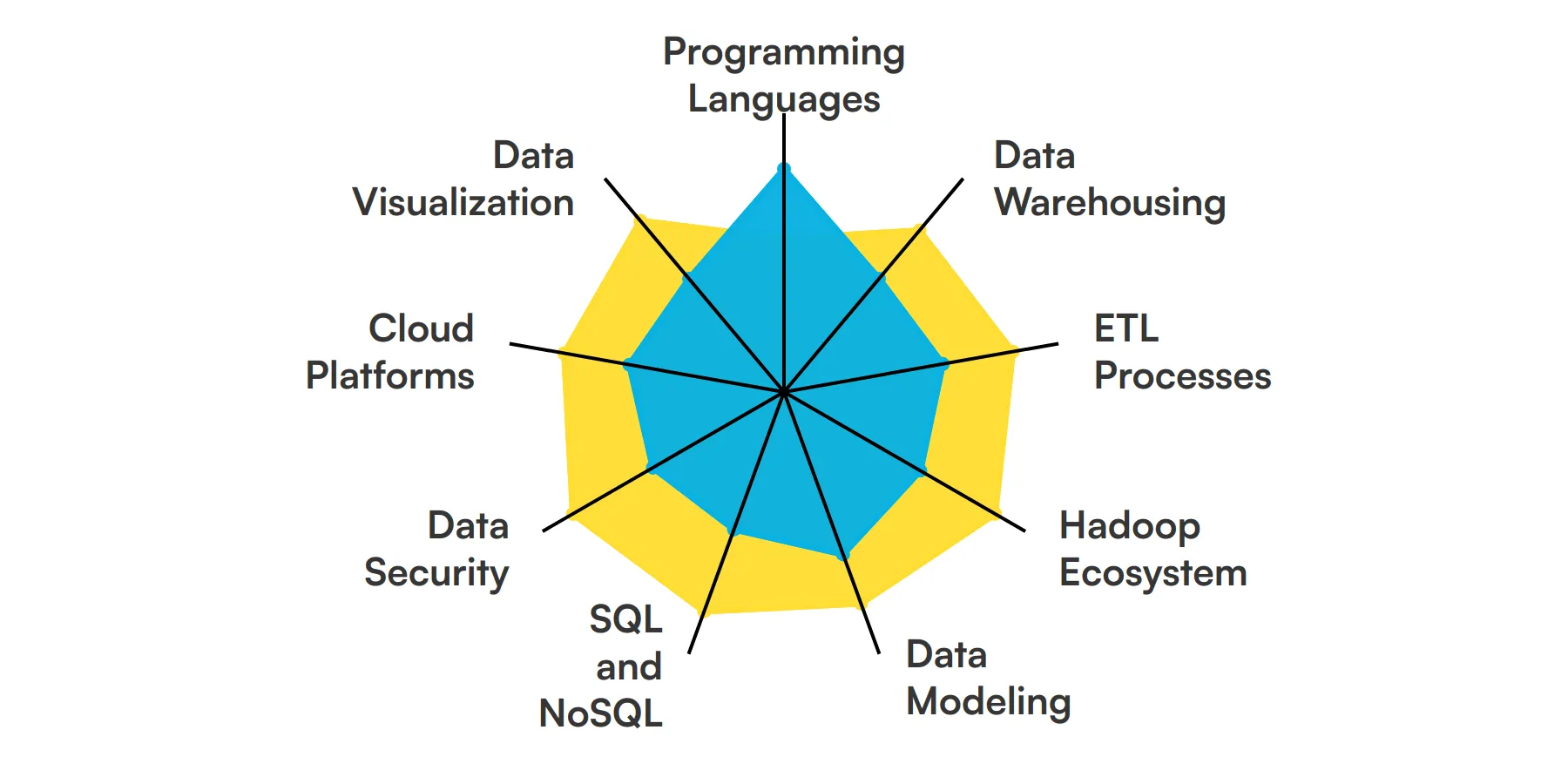
Programming Languages
A Big Data Engineer must be proficient in programming languages like Java, Python, and Scala. These languages are essential for writing data processing scripts and building data pipelines. They help in manipulating large datasets and integrating various data sources.
Data Warehousing
Knowledge of data warehousing solutions such as Amazon Redshift, Google BigQuery, and Snowflake is crucial. These tools help in storing and managing large volumes of data efficiently. A Big Data Engineer uses these platforms to organize and query data for analysis.
Check out our guide for a comprehensive list of interview questions.
ETL Processes
Extract, Transform, Load (ETL) processes are fundamental for a Big Data Engineer. They involve extracting data from various sources, transforming it into a usable format, and loading it into a data warehouse. Mastery of ETL tools like Apache NiFi and Talend is necessary.
Hadoop Ecosystem
Understanding the Hadoop ecosystem, including HDFS, MapReduce, and YARN, is essential. These tools are used for distributed storage and processing of large datasets. A Big Data Engineer leverages Hadoop to handle big data workloads efficiently.
For more insights, check out our guide to writing a Hadoop Developer Job Description.
Data Modeling
Data modeling skills are important for designing and structuring databases. A Big Data Engineer uses data modeling to create schemas that support efficient data retrieval and storage. This ensures that the data architecture aligns with business requirements.
SQL and NoSQL
Proficiency in both SQL and NoSQL databases is necessary. SQL databases like MySQL and PostgreSQL are used for structured data, while NoSQL databases like MongoDB and Cassandra handle unstructured data. A Big Data Engineer must know when to use each type.
Check out our guide for a comprehensive list of interview questions.
Data Security
Ensuring data security and compliance is a key responsibility. A Big Data Engineer must implement encryption, access controls, and other security measures to protect sensitive data. Understanding regulations like GDPR and HIPAA is also important.
Cloud Platforms
Familiarity with cloud platforms such as AWS, Azure, and Google Cloud is essential. These platforms offer scalable resources for big data processing and storage. A Big Data Engineer uses cloud services to deploy and manage data solutions.
For more insights, check out our guide to writing a Cloud Engineer Job Description.
Data Visualization
Data visualization tools like Tableau, Power BI, and D3.js are important for presenting data insights. A Big Data Engineer uses these tools to create dashboards and reports that help stakeholders understand complex data trends and patterns.
10 secondary Big Data Engineer skills and traits
The best skills for Big Data Engineers include Machine Learning, Stream Processing, Scripting Languages, Data Governance, API Integration, DevOps Practices, Data Cleaning, Version Control, Business Acumen and Data Lakes.
Let’s dive into the details by examining the 10 secondary skills of a Big Data Engineer.
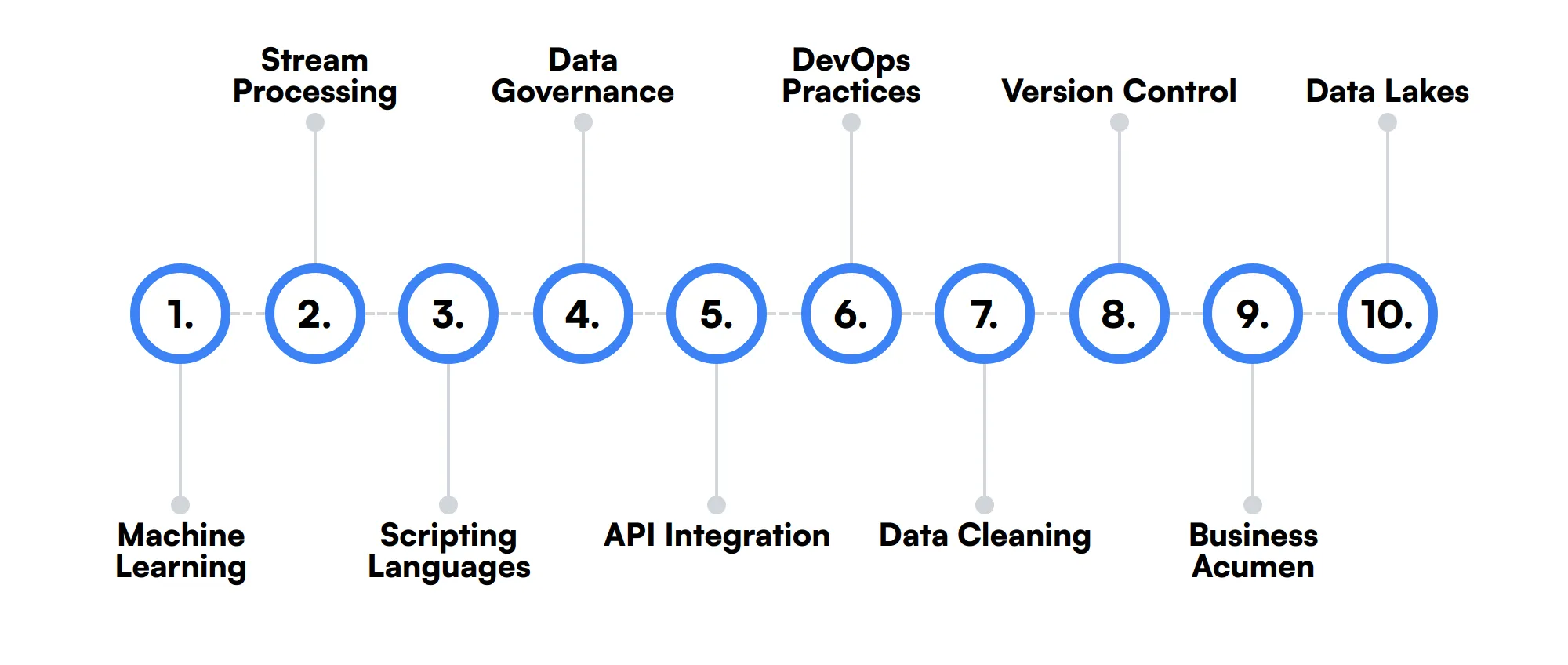
Machine Learning
Knowledge of machine learning algorithms and frameworks like TensorFlow and PyTorch can be beneficial. A Big Data Engineer might use these skills to build predictive models and enhance data analysis capabilities.
Stream Processing
Experience with stream processing tools like Apache Kafka and Apache Flink is useful. These tools allow real-time data processing, which is crucial for applications that require immediate data insights.
Scripting Languages
Proficiency in scripting languages like Bash and Perl can aid in automating repetitive tasks. A Big Data Engineer uses these scripts to streamline data processing workflows and system maintenance.
Data Governance
Understanding data governance principles helps in maintaining data quality and integrity. A Big Data Engineer ensures that data policies and standards are followed, which is important for reliable data management.
API Integration
Skills in API integration are useful for connecting different data sources and services. A Big Data Engineer often works with APIs to fetch data from external systems and integrate it into the data pipeline.
DevOps Practices
Familiarity with DevOps practices and tools like Docker and Kubernetes can be advantageous. These skills help in deploying and managing big data applications in a scalable and efficient manner.
Data Cleaning
Data cleaning skills are important for ensuring data accuracy and consistency. A Big Data Engineer spends a significant amount of time cleaning and preprocessing data to make it suitable for analysis.
Version Control
Knowledge of version control systems like Git is important for managing code changes. A Big Data Engineer uses version control to collaborate with team members and maintain a history of code modifications.
Business Acumen
Understanding the business context and requirements helps in designing relevant data solutions. A Big Data Engineer needs to align data projects with business goals to deliver actionable insights.
Data Lakes
Experience with data lakes, such as those built on AWS S3 or Azure Data Lake, is beneficial. These storage repositories allow a Big Data Engineer to store vast amounts of raw data in its native format.
How to assess Big Data Engineer skills and traits
Assessing the skills and traits of a Big Data Engineer can be a challenging task, given the wide range of technical proficiencies required. From programming languages and data warehousing to ETL processes and the Hadoop ecosystem, a Big Data Engineer must be adept in various domains to handle the complexities of large-scale data management.
Resumes and certifications can provide a snapshot of a candidate's background, but they often fall short in demonstrating real-world proficiency and problem-solving abilities. Skills-based assessments are a reliable way to gauge a candidate's true capabilities and fit for your specific needs.
For instance, you might need to evaluate their expertise in SQL and NoSQL databases, data modeling, and data security. Additionally, familiarity with cloud platforms and data visualization tools is often necessary. Adaface assessments can help you achieve a 2x improved quality of hires by providing tailored tests that focus on these key areas, ensuring you find the right fit for your team.
Let’s look at how to assess Big Data Engineer skills with these 6 talent assessments.
Python Online Test
Our Python Online Test evaluates a candidate's proficiency in Python, covering a wide range of topics from basic syntax to complex concepts like Object-Oriented and Functional programming.
The test assesses their understanding of Python data structures, error handling, file operations, and database manipulation, ensuring candidates can handle practical coding challenges.
Successful candidates demonstrate their ability to debug effectively and write optimized code using Python's extensive libraries and frameworks.
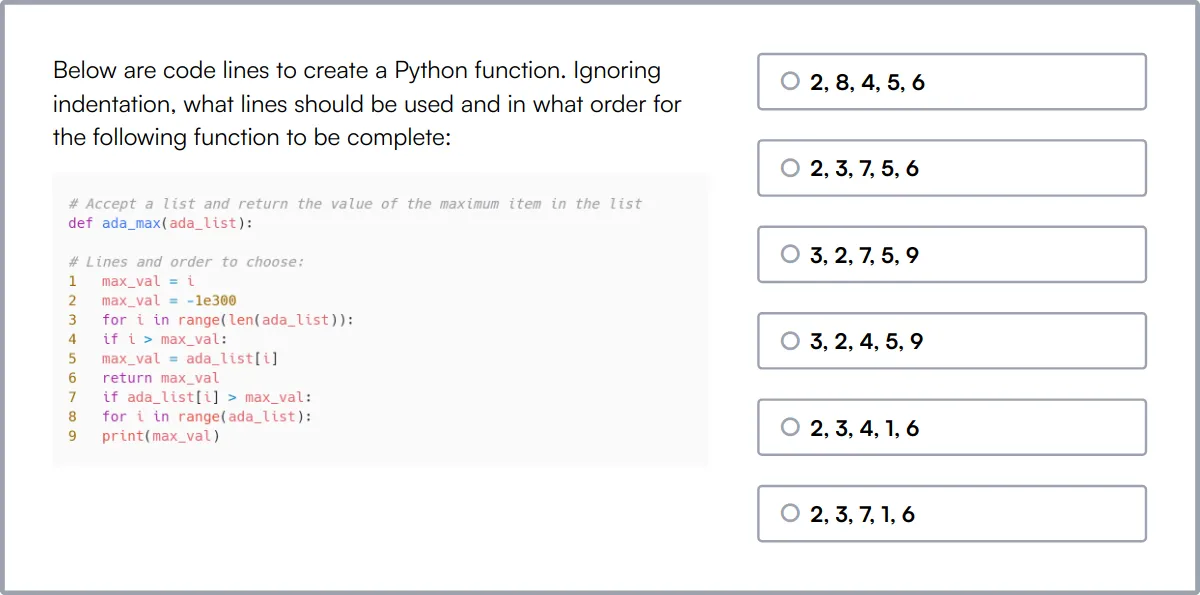
Data Warehouse Online Test
Our Data Warehouse Online Test measures a candidate's expertise in data warehousing, including SQL queries, ETL processes, and data modeling.
This test evaluates knowledge in SQL basics, data warehousing fundamentals, and ETL fundamentals, ensuring candidates can design and maintain efficient data storage solutions.
Candidates who excel in this test are adept at creating and managing scalable data warehouses that support complex data analysis.

Informatica Online Test
Our Informatica Online Test focuses on a candidate's ability to use Informatica PowerCenter for effective data integration and ETL processes.
The test covers data warehousing, ETL, data integration, and the use of PowerCenter tools to manage data transformations and synchronizations.
High-scoring candidates are proficient in designing and implementing complex data handling tasks with Informatica, enhancing data quality and accessibility.
Hadoop Online Test
Our Hadoop Online Test assesses candidates on their ability to configure and manage Hadoop clusters, and to process large datasets using Hadoop's ecosystem.
The test evaluates core Hadoop architecture, including HDFS, YARN, and MapReduce, as well as the ability to write Hive and Pig queries for data analysis.
Candidates proficient in Hadoop can effectively handle big data challenges, optimizing data processing and storage across distributed systems.
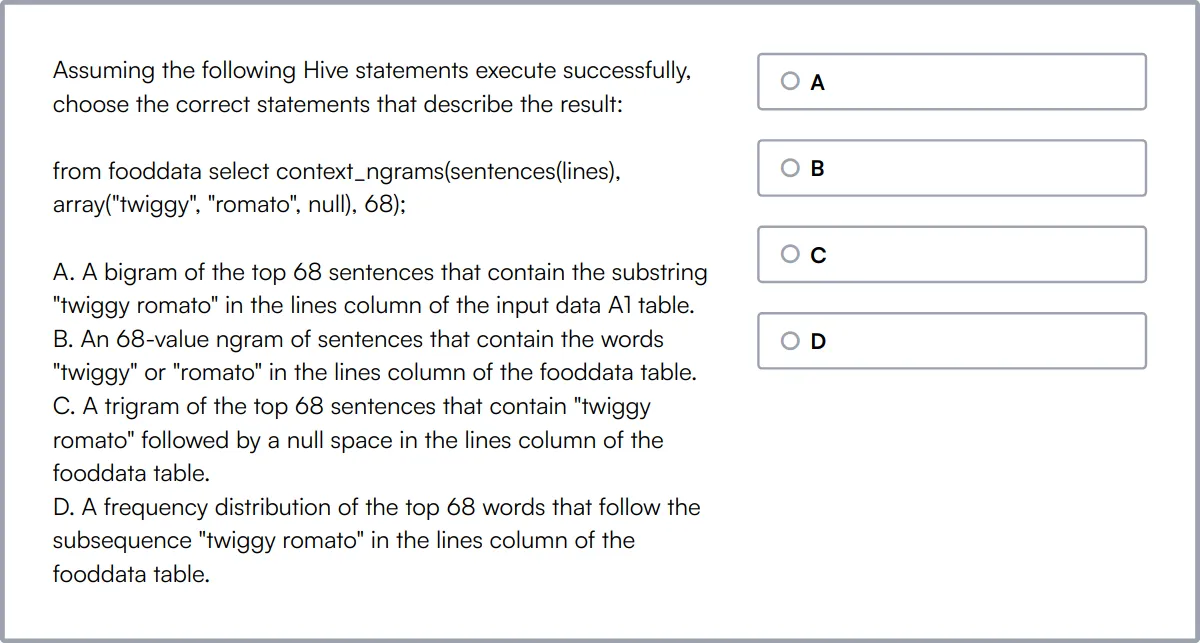
Data Modeling Skills Test
Our Data Modeling Skills Test evaluates a candidate's ability in database design and data integrity using SQL, ER diagrams, and normalization techniques.
This test assesses skills in data modeling, relational schema design, and the implementation of data validation and transformation strategies.
Skilled candidates can design databases that ensure data accuracy and efficiency, crucial for supporting business intelligence and decision-making processes.
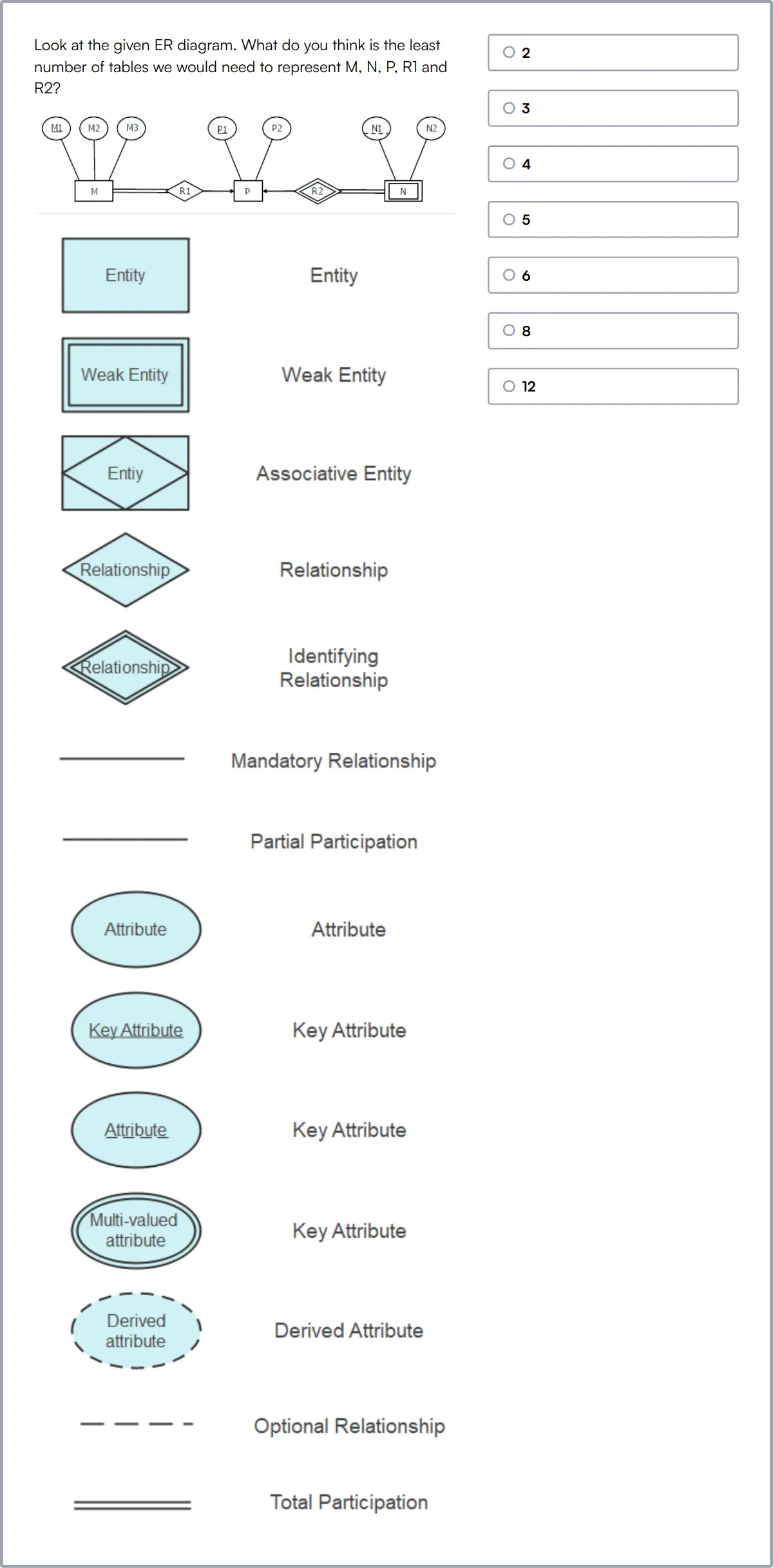
SQL Online Test
Our SQL Online Test is designed to evaluate a candidate's skills in SQL database management, from basic CRUD operations to complex queries and database optimization.
The test challenges candidates with scenarios involving database creation, table manipulation, and advanced SQL features like joins, subqueries, and transactions.
Adept candidates will demonstrate their ability to construct and manage efficient, secure databases, and perform sophisticated data manipulation and retrieval tasks.
Summary: The 9 key Big Data Engineer skills and how to test for them
| Big Data Engineer skill | How to assess them |
|---|---|
| 1. Programming Languages | Evaluate proficiency in languages like Python, Java, or Scala. |
| 2. Data Warehousing | Assess ability to design and manage large-scale data storage solutions. |
| 3. ETL Processes | Check skills in extracting, transforming, and loading data efficiently. |
| 4. Hadoop Ecosystem | Gauge familiarity with tools like HDFS, MapReduce, and Hive. |
| 5. Data Modeling | Determine capability in structuring data for optimal storage and retrieval. |
| 6. SQL and NoSQL | Measure how well a candidate queries and manages information in databases. |
| 7. Data Security | Evaluate understanding of data protection and encryption techniques. |
| 8. Cloud Platforms | Assess experience with AWS, Azure, or Google Cloud services. |
| 9. Data Visualization | Check ability to create insightful visual representations of data. |
Data Analytics in Azure Online Test
Big Data Engineer skills FAQs
What programming languages should a Big Data Engineer know?
Big Data Engineers should be proficient in languages like Java, Python, and Scala. These languages are commonly used for data processing and analysis tasks.
How can recruiters assess a candidate's knowledge of the Hadoop Ecosystem?
Recruiters can ask candidates about their experience with Hadoop components like HDFS, MapReduce, Hive, and Pig. Practical tests or project discussions can also help gauge their expertise.
Why is data warehousing important for Big Data Engineers?
Data warehousing is important because it allows for the storage and management of large volumes of data. It helps in efficient querying and analysis, which is crucial for data-driven decision-making.
What is the role of ETL processes in Big Data Engineering?
ETL (Extract, Transform, Load) processes are used to gather data from various sources, transform it into a usable format, and load it into a data warehouse or other storage systems.
How can SQL and NoSQL skills be evaluated in a Big Data Engineer?
SQL skills can be assessed through queries and database design tasks, while NoSQL skills can be evaluated by discussing experience with databases like MongoDB, Cassandra, or Redis.
What cloud platforms should a Big Data Engineer be familiar with?
Big Data Engineers should be familiar with cloud platforms like AWS, Google Cloud, and Azure. These platforms offer various tools and services for big data processing and storage.
How important is data security for a Big Data Engineer?
Data security is critical to protect sensitive information. Big Data Engineers should understand encryption, access controls, and compliance requirements to ensure data integrity and privacy.
What is the significance of data visualization in Big Data Engineering?
Data visualization helps in presenting complex data insights in an understandable format. Tools like Tableau, Power BI, and D3.js are commonly used for creating visual representations of data.

40 min skill tests.
No trick questions.
Accurate shortlisting.
We make it easy for you to find the best candidates in your pipeline with a 40 min skills test.
Try for freeRelated posts
Free resources



